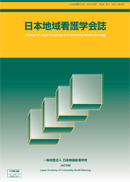Volume 10, Issue 1
Displaying 1-12 of 12 articles from this issue
- |<
- <
- 1
- >
- >|
-
Article type: Article
2007 Volume 10 Issue 1 Pages 35-41
Published: October 10, 2007
Released on J-STAGE: April 20, 2017
Download PDF (907K) -
Article type: Article
2007 Volume 10 Issue 1 Pages 42-48
Published: October 10, 2007
Released on J-STAGE: April 20, 2017
Download PDF (1172K) -
Development of a Qualitative Evaluation Index on the Empowerment Process of Residents' OrganizationsArticle type: Article
2007 Volume 10 Issue 1 Pages 49-58
Published: October 10, 2007
Released on J-STAGE: April 20, 2017
Download PDF (1364K) -
Article type: Article
2007 Volume 10 Issue 1 Pages 59-65
Published: October 10, 2007
Released on J-STAGE: April 20, 2017
Download PDF (991K) -
Article type: Article
2007 Volume 10 Issue 1 Pages 66-71
Published: October 10, 2007
Released on J-STAGE: April 20, 2017
Download PDF (1057K) -
Article type: Article
2007 Volume 10 Issue 1 Pages 72-77
Published: October 10, 2007
Released on J-STAGE: April 20, 2017
Download PDF (918K) -
Article type: Article
2007 Volume 10 Issue 1 Pages 78-84
Published: October 10, 2007
Released on J-STAGE: April 20, 2017
Download PDF (1003K) -
Article type: Article
2007 Volume 10 Issue 1 Pages 85-92
Published: October 10, 2007
Released on J-STAGE: April 20, 2017
Download PDF (1230K) -
Article type: Article
2007 Volume 10 Issue 1 Pages 93-99
Published: October 10, 2007
Released on J-STAGE: April 20, 2017
Download PDF (1116K) -
Article type: Article
2007 Volume 10 Issue 1 Pages 100-105
Published: October 10, 2007
Released on J-STAGE: April 20, 2017
Download PDF (1264K) -
Article type: Article
2007 Volume 10 Issue 1 Pages 106-112
Published: October 10, 2007
Released on J-STAGE: April 20, 2017
Download PDF (1036K) -
Article type: Article
2007 Volume 10 Issue 1 Pages 113-121
Published: October 10, 2007
Released on J-STAGE: April 20, 2017
Download PDF (1305K)
- |<
- <
- 1
- >
- >|
